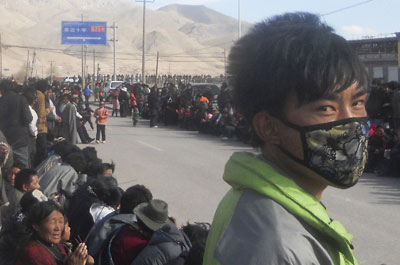Two months into 2012, all-too-familiar stories are emerging from China’s troubled minority regions, Tibet and Xinjiang. Following riots against Chinese rule in 2008 and 2009, violence and its corollaries–increased security and censorship–have become commonplace. Independent bloggers and journalists who cover the unrest pay a high price: Over half the 27 journalists documented by CPJ in Chinese prisons on December 1, 2011, came from ethnic minorities. Now we’re bracing ourselves for the next wave of arrests.
State news agency Xinhua reported that 10 people were fatally stabbed by knife-wielding attackers near the western city of Kashgar on Tuesday. Xinhua said police killed two of the attackers, whom government officials described as terrorists. No confirmation or details, including the ethnicity of the victims or perpetrators, were available, according to international news reports.
Violence has also recurred in Tibet. State media reported that a group of 1,000, some armed with knives, ran riot on January 23, attacking civilians and a police station, leading to an increased security presence in the region. Some Tibetans have turned to a more private form of protest against Chinese rule: International news reports say at least 22 people have set themselves on fire since March 2011. “Self-immolation may be seen as a way to avoid the downside of traditional large-scale street protests”–in other words, the security clampdown–according to Robbie Barnett, who directs Columbia University’s Modern Tibet Studies Program, speaking to the New York-based Asia Society last week.
The incidents in both Kashgar and Tibet were censored. Foreign journalists’ travel to Tibetan areas is restricted and locals are warned not to speak to them, as this NPR story reminds us. Internet and phone near the protests were cut off, according to the Global Post. Censors blocked online discussion of the Xinjiang incident, which was also too remote to enable quick access and confirmation by foreign news outlets, according to The Associated Press. As usual, the government’s version of events is reported unchallenged domestically, and skeptically overseas, but without enough information on either side.
Worse, some detentions have already been reported in 2012, including that of Tibetan writer Gangkye Drubpa Kyab on February 15 in a Tibetan area of western Sichuan province, according to international news reports. “He’s not a journalist, but he wrote a lot of articles and books about the environment, Tibetan culture, everything. He wrote about the news,” Switzerland-based Tibetan activist Jamyang Tsering told CPJ by telephone on Tuesday. CPJ is seeking to confirm reports that two other Tibetans, Dawa Dorjee and Norbu Tsering, are also being held in relation to published writing. We fear they may not be the last we have to report on this year.
